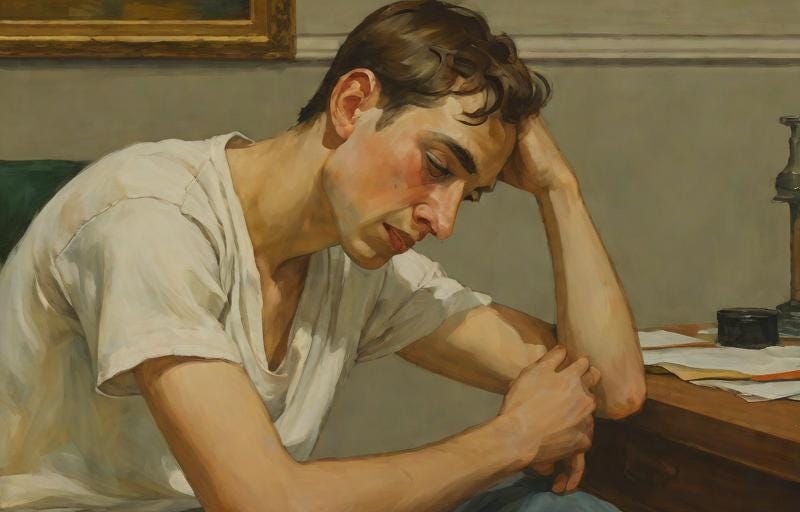In Nathan’s piece, The Providential Reader, he asks “What exactly do we want to pass on to our sons and daughters?” A venerable and continually pertinent question. The answer, as always, is to pass on The Permanent Things. Which is very much Nathan’s point. “Tweeted quatrains” and “Insta poets” are ephemeral and concern themselves with the ephemeral. Therefore, he asks for prospective poets to seriously consider the future reader. I will take him up on that request. As the topic at hand is terribly broad, I aim to explore only one aspect—the direct environment we inhabit. If we are to ask “What are we to do with Poetry?” and specifically “What of Poetry for the Posterity?” we ought to take full consideration of the circumstances. Poetry is in a sore state. Perhaps worse now than when it was degraded in the past. Today, our challenges are daunting. Some of them are the consequence of technology and some are the result of human motivation, ideological and otherwise. Among the most devastating has been a pincer maneuver that assaults discriminating taste while simultaneously deploying limitless assimilation. It must be fully realized that a precious bastion of humanity is under attack. If we wish for Poetry to thrive, it is time to launch a counter-offensive. Let us then state clearly the circumstances that the reader and the poet find themselves in. The celebrated poetry of our day is stupid, asinine, humiliating, sterile, laborious, ugly, treacherous, posturing, insulting, worthless, destructive, licentious, false and an all around affront to decency and greatness. And when it is not busy being a grotesque monstrosity, it addresses us as naked propaganda, not even having the courtesy of making itself comely. If poetry is to be propaganda at least allow me the swell of passion in my breast, but no such pleasantry is afforded. Apparently, I’m not only to be molested by a whore, but an unsightly whore at that. Whatever happened to dignity? Shredded. Along with the rest of our attractive poetry. The language of beauty no longer fills tomes illuminated by scribes but is recorded by accountants in ledgers. Aesthetics no longer concerns itself with moving the soul; It’s busy moving the dial. It’s got to do numbers, impressions, click-thru’s, views, likes, shares—you know the drill. On the other side of the equation is poetry that’s a big nothingburger; Two big soggy buns and no meat. Those poems should stay in the writer’s diary. If they don’t, you end up reading about the glorification of tomato-eating hedgehogs. Which Muse does one invoke to write inanely about hedgehogs? Alright, that’s enough bloviating complaints. Grievances sufficiently enumerated, let us pursue something more constructive. Poetry is seen as effete, pompous, and onanistic. In light of recent poems and the usual, commensurate insufferability of poets, this judgement is not without standing. The poet is therefore tasked with proving otherwise. He’s going to have to show a little nerve—this dog still bites. Why do the poems of our people insist on indulging insignificant matters of mundanity? Poetry has always attended to matters of importance. Why settle for such pittance any longer? Not every poem is an epic nor should it be, but I believe we should clamor for more than “Today I Was Sad: The Poem.” Poetry’s got guts. It’s time we act like it. Neither is Poetry a triviality. It has real importance. It means something. I hope that elaboration of the meaning crisis is no longer necessary. Every man who’s got his wits about him should’ve intuited that meaning in our lives is an increasing rarity. A poem, for a moment in time, is a substantiated monument of meaning. Why pretend that a poem is a superfluous amusement when it is in fact a lightning rod for the heights of human expression. It is a travesty to treat poetry with such cavalier ignorance. A queen is not treated as a bar wench (This of course is no reflection on how one treats bar wenches). Queenship is an overstatement of Poetry’s rank, but regardless, we could at least show a bit of propriety. I said a moment ago that I would clearly state the poetic circumstance at present. I suppose I should get on with it. The situation of the reader is at once immediate and forthright: He doesn’t know how to read. If it’s one thing that modern schooling excels at, it’s teaching the student reading without learning how to read. To be accurate, the student is allowed no interpretive lens by which to understand, which is to say prejudice. The student is allowed no prejudice to judge what he has read. He is taught to be a computer—word processing as opposed to understanding. The educational procedure instills catastrophic self-conscious subjectivity. This procedure requires the student to understand himself as subject and self-consciously insert the self between his mind and what he is reading. There is no longer the knower and the knowable, but now the knower, the self, and the knowable. And in fact, when the transmutation reaches completion, what remains extant is the self and the known. Paradoxically, the radical application of the self-conscious self destroys the ability to recognize the human person and the soul. This is why the poet no longer sings and lacks the confidence to sing. The poet no longer thinks of singing or about the object of which he sings. The poet thinks only of the poet, and since the poet does not sing, the reader does not hear, and so the reader can think only of himself. None of these obstacles are insurmountable. Good poetry is interesting—it’s engaging. It will fascinate the reader, provided he’s been taught to hear the music. Which returns us to our current challenging tasks. On the poet’s part, he must not only write good poems, but also write poems that teach how to read poetry. This is exceptionally difficult and the poet must be humble, as his desire to be great may throw his instructive project into jeopardy. A book written to help a kindergartener learn to read will almost certainly never achieve greatness. Paradise Lost is great, Goodnight Moon is not, but who can despise the latter? Both have their place. As for the reader, he must be hungry. He must refine his palette to desire finer foods. He must desire more out of his poems. He must go at them like Torquemada, ruthlessly questioning until they confess their secrets. The reader must be confident that there are treasures to find in poetry and he must become indignant when he digs up fool’s gold. A poem is a microcosm of adventure, discovery and elation. That is no small thing, and the reader ought to embark for himself.
Discussion about this post
No posts






Amen!
You wrote: "The celebrated poetry of our day is stupid, asinine, humiliating, sterile, laborious, ugly, treacherous, posturing, insulting, worthless, destructive, licentious, false and an all around affront to decency and greatness. And when it is not busy being a grotesque monstrosity, it addresses us as naked propaganda, not even having the courtesy of making itself comely..."
Come on, this is horseshit.Just recently our Laureate was Joy Harjo and that was at the center of the system. She is brilliant. There is tons of junk but that is what taste is for, to find the radiance. Plenty of it around, coming in from the four directions, just some of the stuff coming out of Ukraine (see Kaminsky for clues) is as good as anything from the good olds. Everything that is silver and lights the night waxes and wanes. Write from what you love to what you love about what you love. Save the mudslinging for the idiot wind of social media.